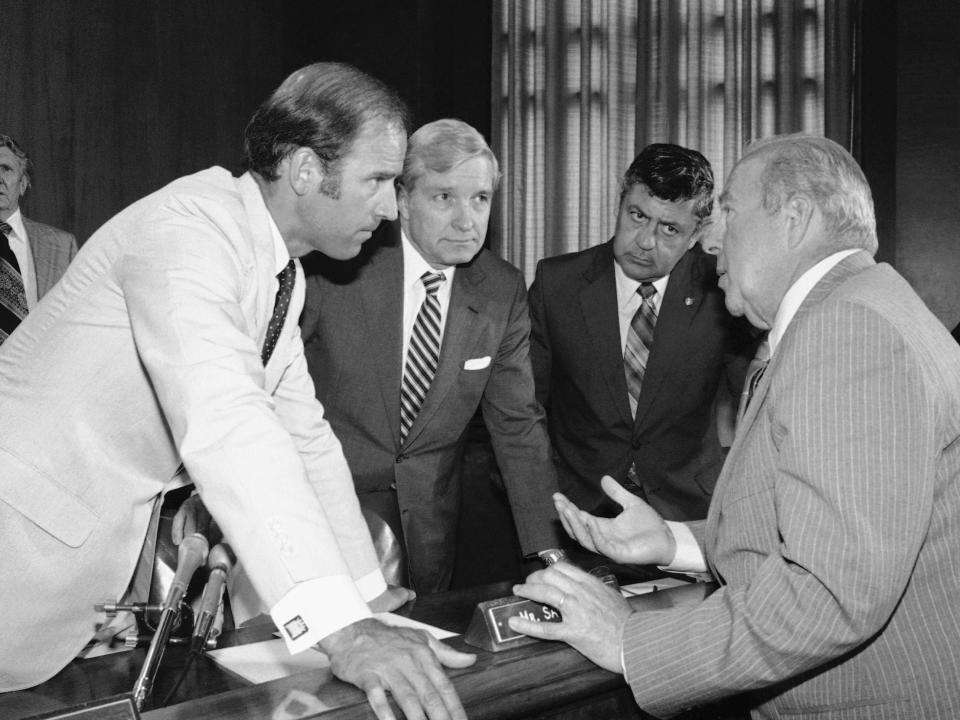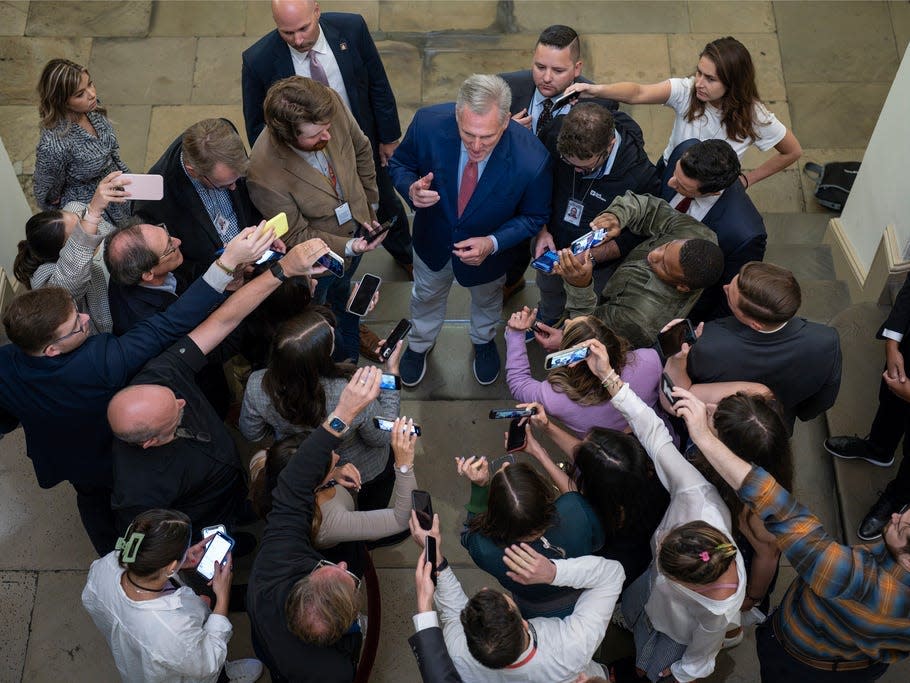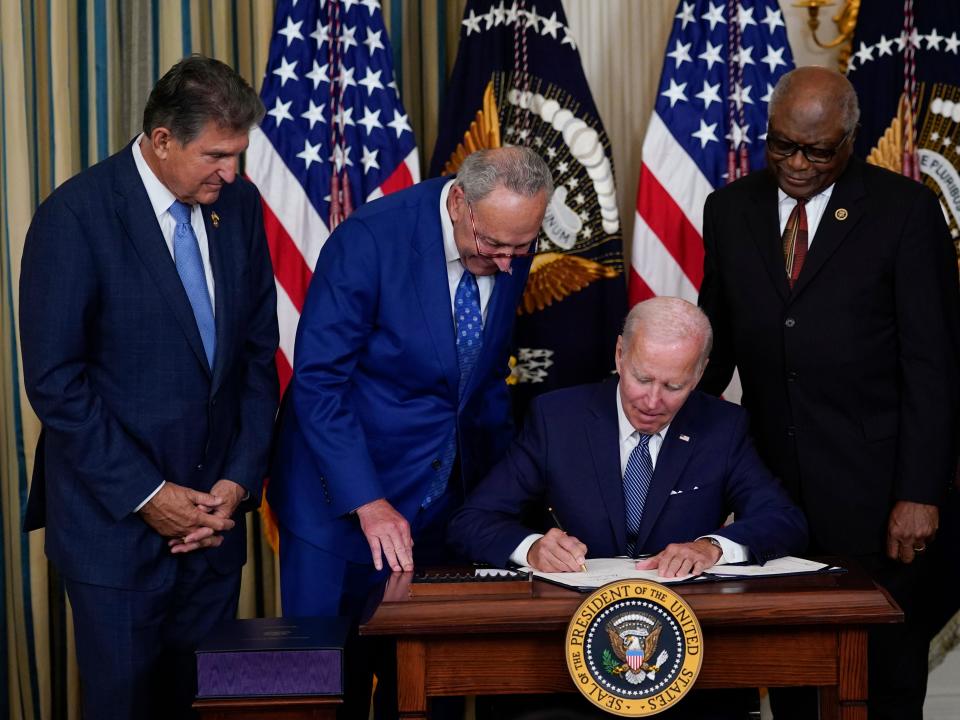The bill to arm Israel and Ukraine could be the last great fight of Biden's political life
- Oops!Something went wrong.Please try again later.
Biden has little chance of passing ambitious legislation given the state of Congress, and faces a tough election.
After decades of service in Washington, much of it on the Senate Foreign Relations Committee, Israel and Ukraine will define his legacy.
This last package, which would fund the pair of allies, could easily be the last major piece of legislation his administration accomplishes.
Thursday night President Joe Biden spoke to the country in a rare Oval Office address, having just returned from what sounded like a demanding trip to Israel.
The address sought to illustrate the stakes of a pair of far-off conflicts, one in Eastern Europe between Ukraine and Russia and one on the shores of the Mediterranean between Israel and Hamas, making the case that American intervention by means of aid, armaments, and intellect is not just worthy but necessary.
For Biden, though, this bill is important. If he is able to secure the funding from Congress and fund Israel and Ukraine to the extent he hopes, it appears increasingly likely that it will be the last major piece of legislation he'll be able to accomplish in his first term of office. And as there are no guarantees in political life, there's a pretty decent chance it could very well be the last major thing he does in Washington, period.

Biden's legacy was already strongly linked to foreign policy.
The president cited the late former US Secretary of State Madeline Albright's assessment that the US is the "indispensable nation," and that peace is attainable but only if Americans are willing to invest in it. He would know Albright's work; he'd just become ranking member of the Senate Foreign Relations Committee at the time her nomination to Secretary of State was confirmed by the Senate.
These are not new perspectives from the president. Say what you will, but even his opponents would gladly concede that his record is, if anything, long.
After five decades in Washington, much of it spent either serving on or in the leadership of the Senate Foreign Relations Committee, that Biden would be sympathetic to and seek to arm allies is hardly a surprise given his longstanding and, pretty much, unblemished reputation in the liberal internationalist wing of the party.
Beyond the argument that the geopolitical machinations of Russian President Vladimir Putin must be opposed, like any good politician up for election next year Biden snuck an economic case in there, remarking that many of the armaments that would be sent to Israel and Ukraine are drawn from existing stockpiles, stockpiles that would be replenished thanks to the labor of workers in factories in places like Arizona.

This bill will not be easy
Now, he's got his work cut out for him. Parts of the Republican party don't want to fund Ukraine. Parts of the Democratic party are hesitant to cut a blank check to Israel. Congress is a mess.
The Senate has presented problems: with the pique of a single member holding up essentially every promotion in the entire military, with his party holding a slim majority, with that majority at times tough to wrangle, and with Chairman of the Senate Foreign Policy Committee Bob Menendez under indictment amid a bribery scandal and coughing up the gavel until that's sorted.
The House is in chaos. The Republicans ousted their speaker, the likeliest heir to the gavel gave up when it became obvious he lacked the votes, the candidate who could conceivably placate the insurgent wing of the GOP that ousted the original speaker does not seem to have a viable path to the office amid opposition from GOP moderates, and the person ostensibly running the chamber is in legal limbo and we don't actually know what he's allowed to do, constitutionally.
On Biden's side is the reality that generally speaking, most of the people in both chambers of Congress probably support an aid package to Israel and Ukraine, and it's not particularly obvious that the opponents will be able to sink a package entirely.
That said, this is Congress we're talking about here, so nothing is easy.

Realistically, there may not be another signature Biden package to come
The main thing is, this may be it for Biden.
Given the sheer extent of partisanship in the United States, a Republican ham sandwich and a Democratic turkey sandwich would likely split the popular vote 51-49 or 49-51. That's just where we're at as a country.
While the president has several arguments to make to the electorate regarding the state of the economy, the end of the pandemic, fairly remarkable jobs numbers, and what's increasingly likely to be a known and deeply polarizing opponent, make no mistake, the guy can lose this.
The implications of a potential third-party bid from a high-name recognition scion, the chances the economy can turn, whatever gas prices might be this time next year: it's absolutely possible that this is Biden's first and last term in office, even setting aside any unexpected health or primary challenges.

This is the legacy
The first Biden term has had a number of hits: legislatively the bipartisan infrastructure bill and the Inflation Reduction Act among them, not to mention the previous rounds of funding for Ukraine. The Biden administration already has built the foundations of a compelling domestic policy legacy.
But this Congress isn't likely to give Biden any more domestic wins. If there is a bipartisan coalition that exists within the US Congress, Israel policy and Ukraine policy might very well be it. It's extremely likely that this is the last big piece of legislation that Biden can conceivably get passed before the election begins in gusto, and that election could truly go either way.
If he loses, one cannot conceive of him making another attempt in 2028: this will be his last stand, and while he may very well be elected, a tough Senate map this year makes the possibility he has a compliant legislature in 2025 a real question mark. During the Obama administration, the president was pretty much boxed out of ambitious legislative efforts in his second term owing to an intransigent GOP. If anything, the GOP has only gotten more reluctant to play ball
All that is to say, that this very well could be it, the last big legislative effort of the Biden-Harris administration. We'll see if he can make it count.
Read the original article on Business Insider

